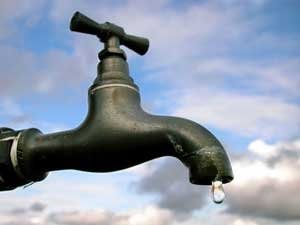 Water restrictions are still very much in the news today, with a piece in the main Telegraph edition headlining: "Hosepipe bans 'just a publicity stunt'".
Water restrictions are still very much in the news today, with a piece in the main Telegraph edition headlining: "Hosepipe bans 'just a publicity stunt'".As always, though, it is in the business section that you find most sense, this time in an article written by Stephen Seawright which asks, "Where are our liquid assets going?"
"Half a dozen water companies have surprised customers in the past few weeks by bringing hosepipe bans in the South East of England forward to the spring," says Seawright. "The restrictions come despite the industry investing £17.3 billion from 2000 to 2005 with a similar amount planned for up to 2010."
He notes that "high capital expenditure has been used to justify sharp rises in water bills of 12 percent in 2005 with another 5.5 percent climb this year. Yet despite all the investment, 0.8 billion gallons of water leaks from the distribution system every day."
And the reason? "The water industry has already had years of high investment since privatisation in the early 1990s. But much of the money already invested by the water industry has not gone to increasing capacity but towards meeting new regulations from the government and Brussels to improve the quality of water and sewage treatment."
The head of one private water company is cited, saying: "There have been a raft of standards surrounding drinking water quality. Now most of these are on the waste water side of the business."
Water companies say the five-year spending programme approved by Ofwat for the period up to 2010 has allowed for more infrastructure spending to help increase capacity. But even then, just under a third of the approved £16.8 billion of investment is earmarked for further improvements of water quality and sewerage treatment.
As a result, Ofwat claims hosepipe bans are preferable because the scale of investment required to end them would push bills to unsustainable levels.
The only argument I have with this is the claim that the money has been spent "meeting new regulations from the government and Brussels". Water quality is entirely an EU competence and it is, therefore, solely to Brussels that we must look for the distortion in spending priorities.
As we pointed out in our earlier piece, it is about time that the blame for the current situation was put fairly and squarely where it belongs.
COMMENT THREAD
No comments:
Post a Comment
Note: only a member of this blog may post a comment.